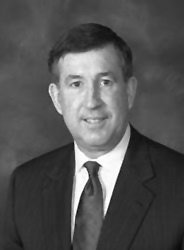Monmouth University President Takes on New Role

For the better part of three decades, Paul G. Gaffney II toured the world’s oceans — above and below — as one of the U.S. Navy’s most respected oceanographers.
(From APP.com / by Carol Gorga Williams) — But he did so largely anonymously until a group of colleagues approached the U.S. Board of Geographic Names with an idea: Name an undersea ridge deep in the South China Sea after the current president of Monmouth University.
Gaffney Ridge sits about 220 miles west of the Philippines in an area where Gaffney spent most of his career.
Now the retired vice admiral, who came to Monmouth University in July 2003 after stints as head of oceanography for the Navy and later, as leader of the Office of Naval Research, is getting his feet wet again, so to speak.
Gaffney, who served on the U.S Commission on Ocean Policy, has been named head of the Ocean Research & Resources Advisory Panel, which provides independent advice and guidance to leaders of more than 25 federal agencies whose missions involve ocean science and management.
“Paying attention to what goes on in the ocean, especially the oceans bounding the U.S., is critically important,” Gaffney said during a recent interview. “”We are the greatest maritime nation in the history of the world, and part of that is because of our position between two oceans.”
Gaffney, who will serve a two-year term as panel chair, noted the U.S.’s relationship to a third ocean.
The Arctic is already “an incredible important ocean as we try to sort out what is going on with climate change. . . . Climate change, whether you like it or not, can have big consequences on commerce and our way of life, regardless of which side of the issue you take,” he said.
During its August meeting in Washington, D.C., the panel focused on issues such as an enhanced integrated ocean observing system, offshore renewable energy, ecosystem management and climate and ocean measurements in the Arctic.
Recent ORAP priorities have included discussions on education and ocean industries and about ocean observing.
“What that means is what the federal government is doing to observe the ocean on some regular coordinated basis, just like we do the weather,” said Gaffney, who presides over a diverse panel that includes educators, scientists, ocean industries representatives and government employees and retirees.
Gaffney said the panel also will likely be asked to examine the issue of ocean acidification, which occurs when carbon dioxide from the air mixes with water, making the oceans more acidic and making it more difficult for marine life to survive.
“A new topic for us is marine spatial planning,” Gaffney said. “You would call this zoning or land use planning if it was in the borough. It is to help manage the uses of the ocean.”
The panel’s charge takes in the coastline as well as the Great Lakes. ORAP also prepared a long memo for the Obama transition team. The memo dealt with issues such as obtaining food from the ocean, ocean pollution, severe storms, maritime trade, port navigation, ocean diplomacy and national security. Climate change and renewable and nonrenewable sources of energy also would dominate policy discussions, the memo said.
Obama in June created an Interagency Policy Task Force empowered to create a national policy for dealing with ocean issues. Gaffney has testified before the task force.
“We can’t write checks or pass legislation, but we do make recommendations,” Gaffney said. “There is a federal research priorities plan that is being updated now. The whole research scheme will be written over the next year. We will participate in that.”
Gaffney is no stranger to research. In 2001, he received the Navigator Award from the Potomac Institute. The award noted Gaffney “”completely restructured Naval research through the Future Naval Capabilities process, allowing for better discoveries and for more rapid transition to the warfighter. He also successfully led the protection of vital basic national science investments.”
Gaffney, who served as head of the Naval Meteorology and Oceanography Command, retired from the military after a stint as head of the National Defense University that ended in 2003 when he came to Monmouth.
“Our consistent theme, while we cover many, many aspects of ocean research and management (and echoed in the U.S. Commission on Ocean Policy report) is we don’t understand enough about what is going on in the ocean, especially when compared with what we understand about the land and the atmosphere,” Gaffney said. “We should be collecting data routinely and that data should inform policy making.”
A 1968 graduate of the U.S. Naval Academy, with graduate degrees in mechanical engineering and business administration, Gaffney believes he still has something to learn and something to teach about the oceans he traveled for so long.
The oceans are having profound effects on the quality of life in this country, even for people who live far inland, Gaffney said. Problems in the Gulf of Mexico, for example, can be traced to runoff from farmland in the upper Midwest.
“It is really a national issue,” he said. “So much of our quality of life and our financial well being is tied to the oceans. In our own area, every person living in New Jersey lives in a coastal watershed county. Something we do in every county can affect the ocean via the Hudson or Delaware rivers or the coast. Marine transportation and recreation are huge industries for this whole state. Not to understand all the implications of all of this is just crazy.”


